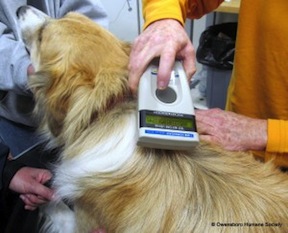
Photo courtesy of Owensboro Humane Society
The process of finding the owner of a lost pet via the animal's microchip begins with a scan.
When a group of Silicon Valley entrepreneurial pet owners started a search engine called checkthechip.com, their hope was to help bring a little order to the
bewildering realm of pet microchips. Right away, they discovered that their attempt potentially worsened matters.
“We quickly realized that we were adding another option for people to become more confused,” said Olivia Sadlowski, founder and CEO of the company behind the website, Chloe Standard.
The confusion arises from the steps involved in trying to identify a lost animal through its microchip. First is getting the animal scanned with the right equipment. Not every scanner is capable of reading every chip. Next is taking the number shown by the scanner and figuring out which registry, out of multiple possibilities, keeps the animal’s identifying information. A final step is determining whether the chip was ever registered at all, and if so, whether the registration information is up-to-date.
The aim of the online search was to simplify the second step by streamlining the hunt for the right registry. But users sent the company inquiries on matters far beyond the scope of the website. “We had so many people emailing us saying, ‘I found this pet ...’ and multitudes of questions surrounding pet microchip registration,” Sadlowski recounted.
Loath to add to the confusion, the team pulled the plug on the search tool less than a year after its debut in August 2009.
A second microchip search site,
www.petmicrochiplookup.org, was
introduced by the American Animal Hospital Association (AAHA) about the same time. It remains in operation and has become an established tool used by veterinarians and others. AAHA reports the engine is used 30,000 to 35,000 times per month on average.
But the tool doesn’t have access to all registry databases. While it can search 13 registries, it is missing two major databanks — those of Avid Identification Systems Inc. and 24PetWatch.
Competition among marketers of pet microchips in the United States historically has stymied efforts to make their application more universal, whether by using a common radio-frequency signal to enable detection by a single type of scanner; or developing a central registry.
AAHA spokeswoman Kate Spencer said the organization hoped when it created the search engine to include all players. Since then, AAHA has not continued to actively solicit participation but, she said, “The offer is always open to those that want to be added.”
Dr. Dan Knox, Avid’s head of companion animal field operations service and support, said that although the company’s registration database isn’t represented, if someone were to enter an Avid chip number into the engine, the tool would identify the chip as manufactured by Avid and display a telephone number for the company.
Moreover, he said, when an Avid chip is scanned, the company name shows along with the chip number.
Why 24PetWatch doesn’t participate is unclear. The registry’s manager could not be reached for comment.
The registries to which the AAHA tool has access are: AKC Reunite, EIDAP, Found Animals, HomeAgain, HomewardBound, InfoPet, Microchip I.D. Solutions, Microchip ID Systems Inc., PetKey, PetLink, Save This Life, SmartTag Microchip and 911PetChip.
Spencer was unable to say what proportion of registrations may be found through the search engine, in part because the ever-changing business landscape makes the universe difficult to define. “There are so many companies nationally and abroad,” she said.
Also, she said, AAHA does not know how many chip numbers are located in a given database. Its tool does not search an in-house database, but rather, calls the web services associated with participating databases.
Unlike Chloe Standard, AAHA said petmicrochiplookup.org has not drawn numerous general questions on microchipping issues. “Really, the only thing the tool is supposed to do is to help people find the manufacturer of the chip,” Spencer said. “We’ve made a concerted effort to make that clear, so there’s no confusion about what we’re trying to do.”
Chloe Standard had greater ambitions to simplify the use of pet microchips, with the registry search tool just a start. While the company no longer exists by that name, the team behind it hasn’t lost its desire to improve the use and efficacy of pet microchips.
Last week, the company, renamed Check the Chip Inc., revived the site
www.checkthechip.com, stating its intention to develop a “hardware platform” that “provides the ability for the public, registration databases, pet owners, veterinarians, animal shelters, municipalities and other industry participants to have a tool, free (to) use, whenever they should need it."
This approach,” the site goes on to say, “varies drastically from the current microchip database structures where up to ten parties are involved in the reunification process.”
Without giving details, Sadlowski told the VIN News Service that the new approach will address both scanner incompatibilities and the gap between embedding a chip and keeping accurate, accessible registration data on file.
The revived site notes, “Our solution isn’t ready yet,” and directs those who are seeking a found pet’s microchip registry information to the AAHA lookup tool.